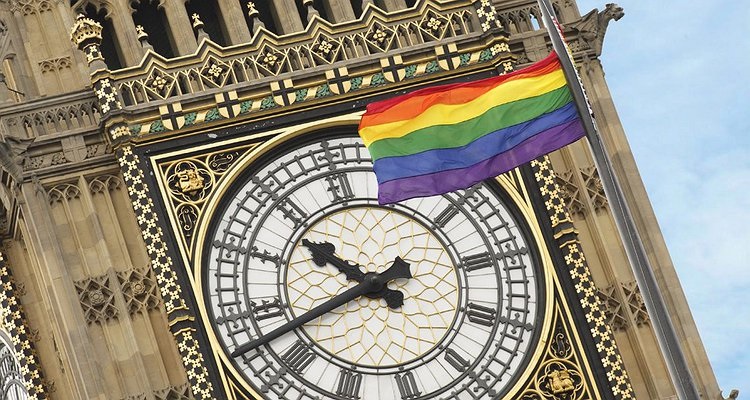IDAHOBIT 2020: ‘Why the LGBTQ community must be even more vigilant in these uncertain times’
We have already seen prejudice rear its head during this crisis. It must not be allowed to take root, writes Philip Baldwin.
By Will Stroude
17 May marks International Day Against Homophobia, Transphobia and Biphobia (IDAHOBIT) Since Coronavirus severely impacted the UK, just over two months ago, all of our lives have changed.
With many Pride festivals and other events cancelled or postponed, it is more difficult for LGBTQ people to show solidarity and progress the LGBTQ rights agenda. There have been some great initiatives to bring people together online, but these are no substitute for the Pride festivals, protests or political lobbying which would have taken place without Coronavirus.
Prior to Coronavirus, in the UK, we were still making significant progress on LGBTQ rights. In March 2019, Parliament voted in favour of compulsory and same-sex inclusive sex and relationships education in schools and then, in the second half of 2019, it became apparent that equal marriage would be coming to Northern Ireland.
On the eve of the “lockdown”, on 15 March 2020, the news broke that Pre-Exposure Prophylaxis (PrEP), a pill which prevents the transmission of HIV, would finally be routinely commissioned on the NHS in England. These were all changes which activists like myself believed to be long overdue.

My main concerns, prior to the pandemic, were rising levels of hate crime, the treatment of LGBTQ asylum seekers and the long delays to the proposed and much needed reform of the Gender Recognition Act 2004 (GRA).
It was therefore with great disappointment that I read Liz Truss, the Minister for Women and Equalities, speech given to the Women and Equalities Select Committee at the end of April, which has subsequently been followed up with a series of remarks by the Minister on Twitter.
With the launch of the consultation on GRA reform, back in 2018, the LGBTQ community, particularly trans and non-binary people, had hoped to see sensible reform, updating the existing act, removing bureaucracy and overly medicalised language and procedures. Such change would bring us in line with other countries, like Ireland and the Netherlands.
The results of the consultation have not yet been announced, but the Minister implied that she was providing a framework in her speech for how reform will be delivered. Then the Minister went on to make a three-pronged attack on trans people.
Firstly, “the protection of single-sex spaces” is emphasised. It is unclear why the Minister was referring to this here, in the context of GRA reform.

The Equality Act 2010 guarantees the rights of trans people to access spaces such as toilets or changing rooms appropriately. The Minister could therefore be construed as seeking to undermine the established protections afforded to trans people in the Equality Act.
Secondly, the Minister referred to a system of “proper checks and balances” for trans people. Surely every person in our society, straight or LGBTQ, is already subject to checks and balances, be they legal or medical, and further restrictions are not required for trans people? GRA reform was about making life easier for trans people, not the reverse.
Thirdly, the Minister discussed trans children, insisting “that the under 18s are protected from decisions that they could make.” As the Minister put it, young people need to be protected from making “irreversible decisions” while they “are still developing their decision making capabilities.”
Trans people, in the UK, cannot access surgery before the age of 18 anyway. After seeing specialist health professionals young trans people can access puberty blockers, which are a vital lifeline. The effects of puberty blockers are reversible if a decision is subsequently taken to cease taking them.

Philip Baldwin is an LGBTQ activist
In terms of informed decision making, the treatment of all young people and the concept of informed consent is set out in the “Gillick competence”, which rules that “children under the age of 16 can consent to their own treatment if they’re believed to have enough intelligence, competence and understanding to fully appreciate what’s involved in their treatment.”
This has been standard practice within all branches of the medical profession since a House of Lords ruling in 1985. Given that we already have the “Gillick competence” as a legal basis, the Minister’s comments on decision making appear misinformed.
Most LGBTQ charities and trans activists were quick to question the contents of the speech. The views expressed in it are also at odds with the publicly expressed views of LGBTQ MPs and Peers – across all three political parties – Conservative, Labour and Liberal Democrat.
At this time of heightened fear for everyone, the Minister needs to reach out and reassure the LGBTQ community. This should begin by engaging with and listening to the concerns of trans people.
On International Day Against Homophobia, Transphobia and Biphobia, I want to reiterate that trans rights are human rights. There is a danger that we are becoming a society where homophobia and biphobia are challenged, but transphobia is tolerated. We – the LGBTQ community and our allies – must not allow this to become the case.
For any LGBTQ people who need support, the LGBT Foundation helpline is available seven days a week: 0345 3 30 30 30
Philip Baldwin is an LGBTQ activist – follow his journey on Instagram @philipcbaldwin
